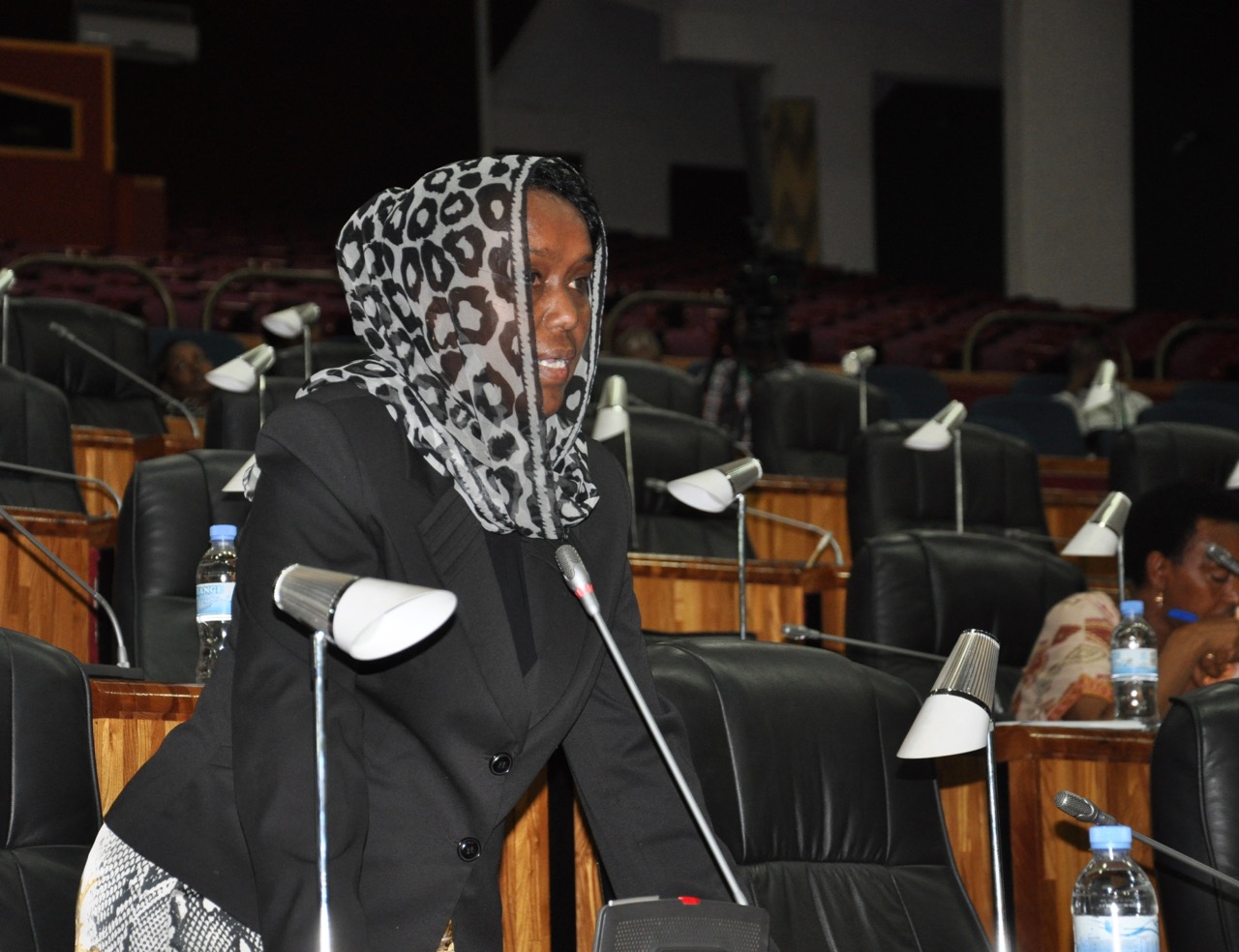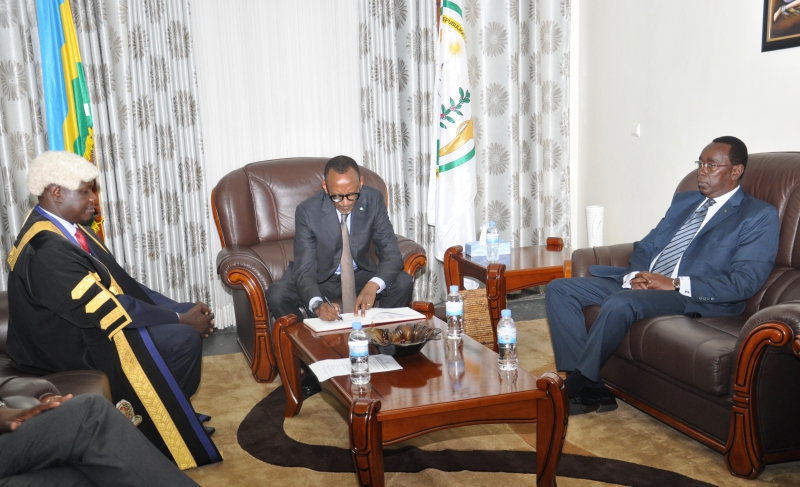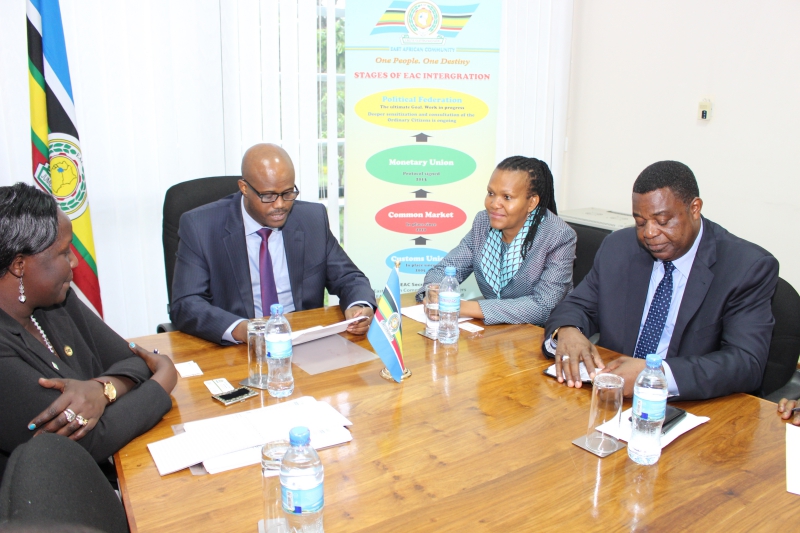
Enhance Implementation of the Common Market Protocol - Assembly Says as It Passes Key Report on Border Pastoralist Communities
East African Legislative Assembly; Kigali, Rwanda; 15 March 2017:
The regional Assembly is calling on the EAC bloc to work closely with cross border pastoral communities to ensure the proactive and effective implementation of the Common Market Protocol.
At the same time, it is anticipated that effective operationalization of One Stop Border Post (OSBP) in the Namanga frontier shall ease trade in the area and specifically in the border areas of Longido, Tanzania and Kajiado, Kenya.
The House yesterday unanimously passed a Report of the Committee on Regional Affairs and Conflict Resolution on the Public hearing on Pastoral Communities on Longido in Tanzania and Kajiado in Kenya on the implementation of the Common Market Protocol projects. The report presented to the House by Hon. Mike Sebalu follows a Public Hearing by the Committee on the Pastoral Maasai Communities of Longido in Tanzania and Kajiado in Kenya on February 19-27, 2017, in the context of the Common Market Protocol.
The assessment was a follow up of the fact-finding mission earlier conducted by the Assembly’s Committee on Pastoralists living in Kapenguria and Kacheliba in Kenya and Nakapiripirit in North Eastern Uganda, in May 2012.
The Committee examined the free movement of persons in the pastoral communities as it sought to understand the level of security among pastoral communities. It further sought to identify the challenges faced by pastoralists in the context of the Common Market Protocol; and the problems thereto.
In its findings, the Committee observed that the two cross border pastoral communities of Longido, Tanzania and Kajiado, Kenya, are interrelated by blood and marriage. Essentially, the report depicts the Maasai speaking people transcend the Tanzania and Kenya borders thus share a cosmology and history that predates colonial experience.
One of the negative impacts of the Berlin Conference, the report states, is the interference and interruption of family and cultural ties of the Maasai that occupy the Longido and Kajiado plains.
“This is the historical context under which the Committee on Regional Affairs and Conflict Resolution undertook the oversight visit to the Maasai communities living on both sides of the Namanga border”, a section of the report states.
The report calls for proactive measures when it comes to providing rapid response, investigation and dispute resolution at community level.
According to analysts, pastoralism is a viable livelihood for a considerable population of East Africans, for over a century now. However, pastoralists have suffered prejudicial treatment reinforced by discriminatory laws and state policies. Developmental interventions in pastoral areas have been characterized by ignorance about pastoralists and the pastoral system.
The Committee’s report further states that many developmental projects have failed in pastoral areas because of stereotypical views held by those in authority (development agencies, NGOs and CSOs). Pastoral areas today are characterized by poverty, lack of economic opportunities, conflicts, low education and poor infrastructure.
The report also states in part that Namanga OSBP did not make provisions for livestock trade and still restricts trade in livestock.
The report observes that a majority of stakeholders on the Tanzanian side of the border lack sufficient knowledge on the operations of the EAC Common Market.
“Most of them thought of an existence of a big market under one roof where people meet for trading purposes”, the report says in part.
Stakeholders at Longido (Tanzanian side) expressed concern about the issue of special passage fee charged per head of cattle transiting on private parcels of land and or boreholes while taking them to the market at the Kaijado County on the Kenyan side.
On the reverse, stakeholders and pastoral communities on the Kenyan side lamented about the challenges encountered, including high population growth rates, encroachment of crop farming on grazing lands, privatization of rangelands and resultant land grabbing as well as insecure land tenure and environmental degradation.
Other challenges faced include conflicts (violent/arms), climate change and variability, unsound development and unfavourable trade policies biased in favour of crops. At the same time, the report cites cheap cows and or beef from Tanzania leading to distortion of prices, ineffectiveness of pastoral traditional risk management strategies, increased food insecurity and poverty levels among pastoralists.
During debate, Hon. Dora Byamukama noted that infrastructure had been enhanced on both sides of the border and said this was a good move aimed at enhancing trade and the integration process. “There is also a good foundation and every reason for the communities living at the border to speed up integration. The people are already moving and integrating”, she said.
“Policy makers must do their part to ensure we realise the objectives of integration”, Hon. Byamukama added.
Hon. Martin Ngoga said the communities living at the border points were ahead of the technocrats when it comes to enabling movement, mutual support to each other and business.
“In future planning, we should think of joint sensitisation programmes and joint on-spot assessments so we can understand the issues together and understand integration”, Hon Ngoga said.
Hon. Sarah Bonaya said women were key stakeholders in the pastoralists communities since they were the home makers. Hon. Bonaya remarked that the vast lands the communities owned and inherited were no longer tenable due to the increase in investments among other things.
“It is time the Communities began looking at cottage industries including other value addition initiatives as alternatives”, she said.
Others who raised support during debate were Hon. Susan Nakawuki, Hon. AbuBakr Ogle and Hon. Dr Nderakindo Kessy.
- ENDS -
For more information, please contact:
Mr Bobi Odiko
Senior Public Relations Officer
East African Legislative Assembly
Arusha, Tanzania
Tel: +255-27-2508240
Fax: +255-27-2503103
Cell: +255-787-870945, +254-733-718036
Email: BOdiko [at] eachq.org
Web: www.eala.org
About the East African Legislative Assembly:
The East African Legislative Assembly (EALA) is the Legislative Organ of the Community and has a cardinal function to further EAC objectives, through its Legislative, Representative and Oversight mandate. It was established under Article 9 of the Treaty for the Establishment of the East African Community.

